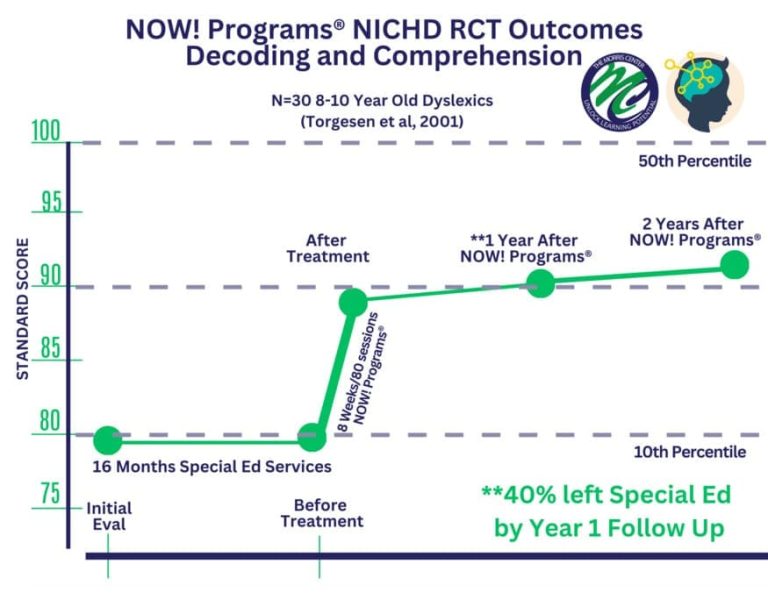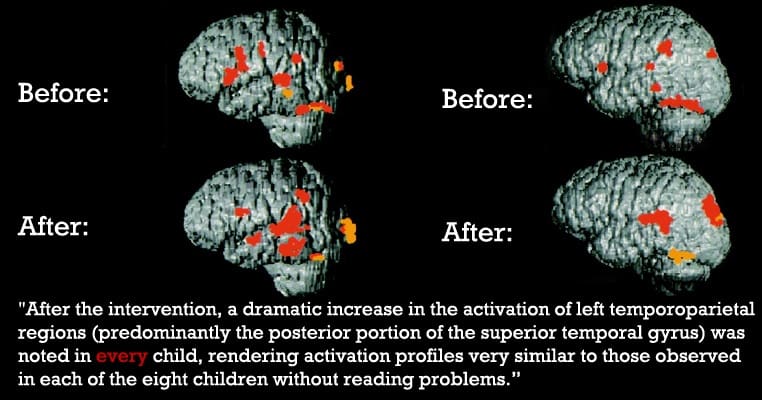Research
Two key findings from our peer-reviewed and published research:
1
Dyslexia can be successfully prevented for Kindergarten age children who are already at risk.
2
Even 8 to 10 year-old children with years of poor reading skills made large improvements in reading skills and phonological awareness from The Morris Center treatment components.
Two key findings from our clinical data:
1
Adults with years of learning difficulty can make dramatic improvements in their reading, comprehension, writing and sensory processing skills at The Morris Center. It’s not too late. Stop declining promotions. Stop being passed over for promotions due to your learning difficulties.
2
We can close the gap for learning and sensory processing difficulties. Our published research studies and 25 years of clinical data support these possibilities.
Our transdisciplinary, intensive, individualized and scientifically proven language, sensory processing, attention and behavior treatments are designed to strengthen the processes and develop the skills that are weak. As weak skills become stronger, then learning becomes more efficient and the child or adult feels more competent and confident. We help them unlock their hidden, true potential. Self-esteem comes from success.
This research supports how one of The Morris Center treatment programs may provide a possible solution for children and young adults who are hindered by learning difficulties, such as dyslexia.
Individuals entering the program experience rapid growth in reading performance through a 9-week program with proven long-term benefits.

Research data from NICHD sponsored study conducted by Torgesen, J., Alexander, A., Wagner, R., and Conway, T.W. 2001 Journal of Learning Disabilities 2001; 34:33-58

Left hemisphere imaging of 2 subjects demonstrating the decreased activation before intensive phonological intervention and the normalization of the activation after treatment. Images from Simos PG,Fletcher JM, Bergman E, et al. (Neurology 2002;58:1203-1213)
After the intervention, a dramatic increase in the activation of left temporoparietal regions (predominantly the posterior portion of the superior temporal gyrus) was noted in every child, rending activation profiles very similar to those observed in each of the eight children without reading problems.
We apply a unique program (supported by long-term scientific evidence) that has helped our clients with dyslexia re-enter their schools or work place with improved skills that are consistent with their expected range of academic and job potential. Our treatment program is fundamentally different from the approach employed by typical learning centers or tutors — these programs typically treat the client’s symptom or teach them to compensate for their weaker skills. Rarely do these programs or tutors actually aim to uncover the possible causes of the client’s difficulties.
We help build new bridges in the brain (neural networks) that true science indicates are most likely to provide new pathways or better skills. We target treatment only for the client’s skills that need improvement, such as language/learning skills (reading, writing, spelling, comprehension, speaking/expression, memory and critical thinking), sensory processing, sensory processing, attention and behavior.
Conclusion
Adult professionals (physicians, engineers, architects, teachers, speech-language pathologists, psychologists, physical therapists, firefighters, police, etc.) can also have learning difficulties. These adults can still make significant improvements in their cognitive abilities, e.g. language, memory, attention, sensory processing, reasoning, and visual processing. With the proper treatment, improved cognitive abilities can improve adults’ functional skills, e.g. reading, spelling, writing, comprehension, and problem-solving.
Many adults are surprised to find out that it is not too late for them to improve their cognitive and functional abilities. Recent evidence on neural plasticity clearly indicates that new learning and improved functional abilities are possible well into the later years of an adult life. The principles of neural plasticity that dominate the learning of an 8 year-old child are still evident in the learning of an 80 year-old adult.
Essentially, neurons that “fire together then begin to wire together.” Functional neuroimaging has clearly documented evidence of improved neural networks of activity in the adult’s brain in response to new learning or new skill development. Unless the proper treatment is received, a child with learning difficulties typically grows up to be an adult with learning difficulties. Many adults choose professions that utilize their stronger cognitive abilities and minimize their learning difficulties. However, with the proper treatment, these learning difficulties can beimproved for adults. Making weaker skills stronger can provide the adult with a greater range of functional abilities which may lead to greater occupational opportunities. Regardless of age, the learning barriers or learning difficulties that limited an adult’s functional skills, academic pursuits, and occupational or professional choices can be minimized. Significant improvements in cognitive abilities can occur, such that learning weaknesses or barriers can be removed.
Downloads
Further Dyslexia Research
Intensive remedial instruction for children with severe reading disabilities: immediate and long-term outcomes from two instructional approaches
Phoneme-based rehabilitation of anomia in aphasia
Adults with dyslexia: theta power changes during performance of a sequential motor task
Neural substrates related to auditory working memory comparisons in dyslexia: an fMRI study
The Co-occurrence of reading disorder and ADHD, Epidemiology, Treatment, Psychosocial Impact and economic Burden
Professional Talks
EASTERN FLORIDA STATE COLLEGE TALK
Dyslexia - Do you know the “Principles of Neuroplasticity” that support learning - Dr Tim Conway
Eastern Florida State College on October 15th, 2014
Dr. Conway discusses the three key principles of neuroplasticity – the brain’s capacity to learn. These are critical to the success of rewiring the brain and addressing learning difficulties.
